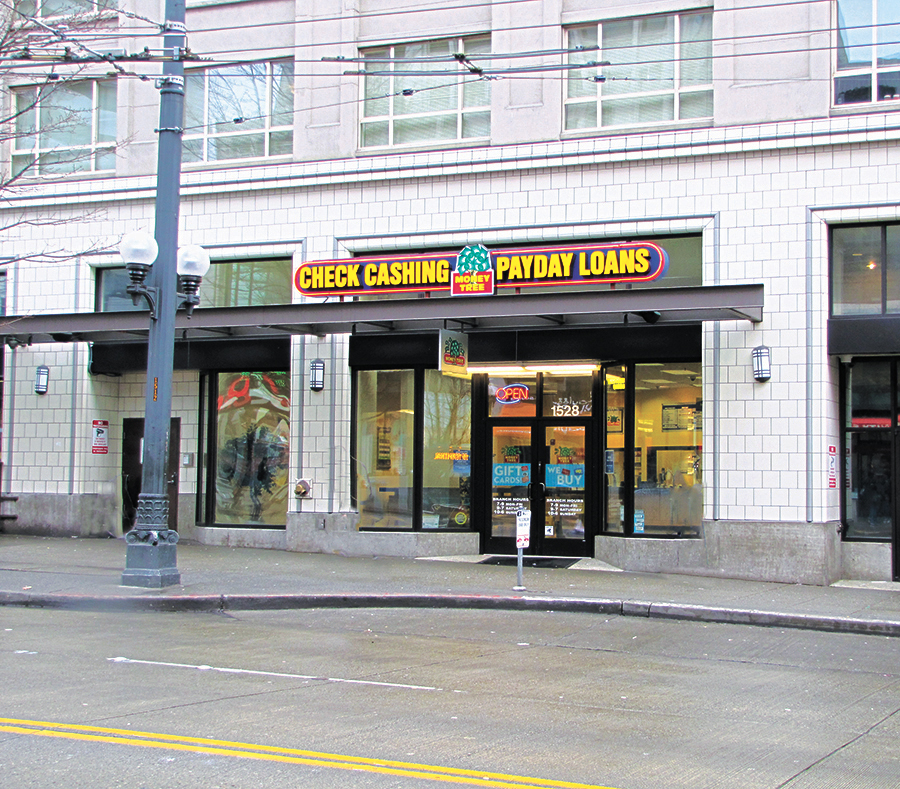State Sen. Marko Liias concedes he’s taking some heat these days. That can happen when a well-entrenched payday-loan lender like Moneytree asks for favors, contributes $3,800 to your campaign, and then hits paydirt in the Senate with a bill—with your name on the dotted line as prime sponsor—that could make the company many, many millions in extra fees charged to low-income borrowers.
“I know this looks really bad, and I’ve heard the complaints, but it’s not like ‘You give me a contribution and you get a bill out of this,’ ” the 33-year-old Lynnwood Democrat told Seattle Weekly last week. “Sure, this industry is not beyond reproach, but a lot of people don’t like the fact that we have a lot of low-income folks who can’t make ends meet, and so there has to be a product like this. And, at the end of the day, this is a lower-cost product.”
The product, as Sen. Liias calls it, is a whole new way that high-interest, unsecured short-term loans can be marketed to poor families, those living paycheck to paycheck. The median income of payday-loan borrowers is just over $22,400 a year, with 70 percent of the loan recipients using the money to cover basic expenses and 16 percent using the cash for emergencies, according to the Consumer Protection Financial Bureau. Nationwide, at any given time, there are an estimated $22 million in payday loans (around $825,000 in Washington) outstanding, and fees collected on those loans by consumer finance firms amount to $8 billion a year.
Washington boasts one of the strongest payday lending laws in the nation. In 2009, the state set firm limits at $700 per loan. Borrowers could be charged a $95 fee by companies like Moneytree, with the entire amount usually due in 14 days. The law also dictates that borrowers can take out no more than eight loans a year.
These reforms dealt a major fiscal blow to payday lenders. Not only did the number of statewide locations shrink from around 500 in 2009 to about 170 last year, but the value of total loans issued plummeted during that period, from $1.3 billion to $331 million in 2013, the last year for which numbers were available from the state Department of Financial Institutions.
This did not sit well with lenders, and the industry, with Moneytree leading the charge, has spent the past several years lobbying lawmakers to rejigger the law. As The Seattle Times first reported, they also enlisted, to the tune of $8,000 a month, Seattle-based Sound View Strategies, a high-powered Democratic public-affairs firm. One of its principals managed former Gov. Chris Gregoire’s 2008 re-election effort; another served as a major fundraiser for Gov. Jay Inslee’s 2012 campaign.
Moneytree, which in last fall’s election contributed $95,100 to Washington legislative candidates ($58,000 to Republicans; about $48,000 to Democrats), wasn’t looking only to roll back the reforms. The company that opened its first branch in Renton on Halloween 1983 and now has offices in British Columbia, Southern California, Colorado, Nevada, and Idaho wanted to scrap the traditional two-week payday loans and shift to “installment loans,” which would stretch to six months or more. Liias said the company first approached him three years ago about the plan.
Sen. Pramila Jayapal (D-Seattle), a former Wall Street investment banker, told us Moneytree’s desire to soften lending laws is purely a matter of economics. “With the new [installment] plan they can go from the $47 million that they earn in fees now to $243 million.”
Liias’ bill, SB 5899, which would keep the loan limit at $700 but permits lenders to charge up to $495 in interest fees if the loan is held for six months, was passed by the Washington state senate by a 30-18 vote on March 10. A similar proposal was defeated in the Washington legislature two years ago, and, in the current legislative session, a companion proposal by Rep. Larry Springer (D-Kirkland)—the recipient last fall of $2,850 in Moneytree contributions—did not come to a vote on the House floor, nor was it even discussed in the House Democratic Caucus.
House Speaker Frank Chopp, in a statement e-mailed to the Weekly, indicated that the Senate bill faces a tough sell in the Democrat-controlled House. Chopp wrote: “The House payday lending bill, which was similar to the bill passed by the Senate, did not pass the House by cut-off because there are many members in our caucus who disagree with the proposed changes. I’m one of those members. I just have a number of concerns about the bill.” Chopp did not elaborate.
According to Moneytree, borrowers prefer a longer period to pay off the loan, and the installment plan—unlike payday loans, which charge fees up front—would give borrowers an incentive to pay their loan early to avoid accruing interest fees. Sen. Liias, a state lawmaker since 2008, said it will cost a borrower only $18 in interest fees if a loan is settled within two weeks. Liias also maintains that payday lenders face higher risks, since borrowers are far more likely to default on loans since the money is unsecured and given without collateral.
Consumer-advocacy groups, meanwhile, argue that the new loan program, if it becomes law, will drive more people into debt. As Sen. Cyrus Habib (D-Seattle) told the Weekly: “What they [payday lenders] are trying to do is change borrowing behavior. Now, you see, if you have six months [to pay it off], you might go out and buy that iPhone or whatever, rather than just paying it off quickly.”
Habib said it was telling that only four people testified in favor of the installment plan: Dennis Bassford, CEO of Moneytree; Dennis Shaul, CEO of Consumer Financial Services Association of America, a payday-lending trade group; and prime bill sponsors Sen. Liias and Rep. Springer. (Bassford did not return a phone call seeking comment.)
“You’d think,” said Habib, “that they could have found someone who would have come to say, ‘This is great. It changed my life.’ ”
Sandeep Kaushik, who works for Sound View Strategies and co-managed Ed Murray’s mayoral campaign in 2013, said he has no problems with the lending approach Moneytree is seeking. “I’ve looked at the policy and it seems to be a pretty reasonable model,” he said. “There’ve been surveys that say 80 percent [of low-income borrowers] prefer the installment plan.”
Sen. Jayapal begs to differ. “This is a travesty. They [lenders] want to make more money on the backs of poor people,” she said. “This was a painful loss, and the thing is, there is no problem. The current system has been working fine.”
Liias, meanwhile, said he has no second thoughts about helping Moneytree. “I wouldn’t have worked on this [legislation],” he said, “if I didn’t think it was going to help our low-income families.”
econklin@seattleweekly.com








